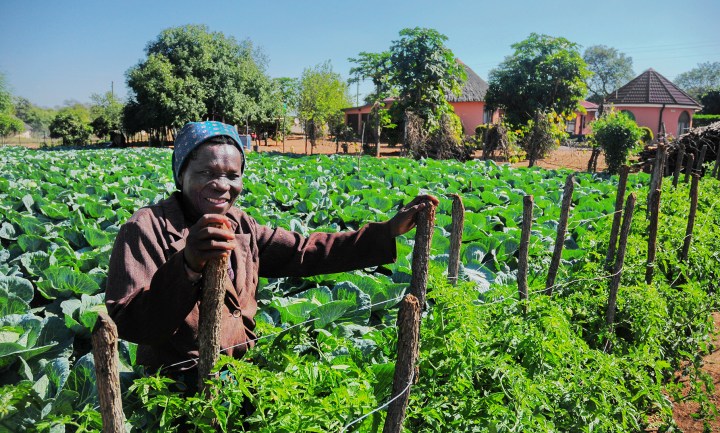
BATTLE AGAINST HUNGER
Women-headed households on the frontline of food insecurity

Although South Africa is classified as a food secure country, at household level the picture is very different — and rural women on farms are particularly vulnerable.
Women’s role in food security cannot be overstated as often they are the ones responsible for providing food for their families, and nowhere is this more evident than in single-headed households, which make up 23.6% of households in South Africa. This is according to a report released by Statistics South Africa in June this year.
The report showed that 42.1% of all households were headed by women, and that female-headed households were most common in rural areas (47.7%). In a discussion held by civil society organisation Black Sash on Thursday — which brought together community activists and NGOs — women’s role in South Africa’s food security came under the spotlight.
Co-director of Women on Farms, Carmen Louw, described the hardships faced by women who work on farms. This includes seasonal employment, which often only lasts for three months. According to Louw, her organisation had observed that the hours of work have been steadily declining, meaning that the work of women was not classified as formal.
“Agricultural work is seasonal and women are often the last to be employed”, often at less than minimum wage rates.
Louw said that mechanisation and technological innovations in farming were on the increase, particularly since the onset of Covid, and that it was mostly young men who were hired to operate the machinery and technology, leaving women with a shrinking number of job opportunities.
Women also faced labour broker exploitation and were not officially registered as workers, which made them vulnerable to working under difficult conditions. This placed a strain on their health, such as exposure to chemical pesticides, which also affected their children’s health.
Inadequate diet
Louw said the erratic income that women received meant they had to rely on child grants. The money was often used to buy starch-heavy food with very little protein and dry off-cuts of chicken which were only available in the two days of Sassa grant payments, meaning an inadequate dietary intake.
This was why many women, Louw told the gathering, resorted to boiling pots of water, giving children the impression that food was coming, and then the kids would fall asleep while waiting. Louw said her organisation often saw women on Facebook “cry of the pain of hunger” and the inability to feed their children.
Visit Daily Maverick’s home page for more news, analysis and investigations
She spoke of the effects of women’s insecure land tenure in farm areas where they were often reliant on male partners, making them vulnerable to gender-based violence and evictions if their male partners lost their jobs or died.
Louw said if women knew they had access to a basic income grant, the impact of working less during the year and during off-seasons would be lessened as they would still be able to provide for their families. She said farm owners controlled the land in many rural areas and this influenced the patriarchal and class struggles that women faced in their endeavours for food security.
Food gardens
Khayelitsha community food gardener, Ntombi Ndondi, who runs a food garden at Sinako High School, told the audience that she had been tending the garden with other women in the community since 2016.
Ndondi said the garden is able to cater to the nutritional needs of learners as well as her family, while also allowing her and her gardening partner to sell produce at the local food market as well as to their community.
“We love what we do… we love our garden because we know, as mothers, food is dependent on you,” said Ndondi. She said they also encouraged other women to start their own food gardens, even if they only had a small piece of land, to ensure that people ate nutritious food so they could lead healthier lives.
Director of the Social Change Assistance Trust, Joanne Harding, said it was important to remember that food security was about improving the micro-nutrient content of adults’ and childrens’ diets, pointing out that many people are obese, but are still not getting the right nutrients. She said the four key components were availability, access, utilisation and stability.
Climate change
Stability is affected by climate change, such as knowing what you will be able to grow at specific times of the year. Availability was affected by the fact that seasonal farm workers often don’t have an adequate supply of food because they go from “days of abundance” while working, to periods of not having any food when unemployed.
The ability to access the food they required was also affected because on farms, workers had to buy from the farmer, meaning their options were limited. The practice of paying workers with food was also a limitation to their nutritional needs.
Harding noted that in times of emergencies like the pandemic, women were often at the forefront of responses like putting together food parcels, running soup kitchens and rallying financial support for food. And yet they were the last to be beneficiaries — particularly of land redistribution and restitution — because land has been used in political battles and food has been commodified.
“Women grow, gather, bring food home, cook the food and distribute it to their families,” said Harding. DM/MC



















Comments - Please login in order to comment.